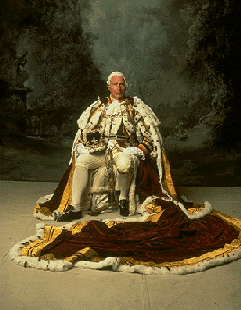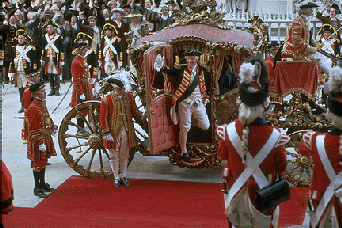
"The Madness of King George"
David Barson
Department of English
University of Otago
New Zealand
david.barson@stonebow.otago.ac.nz
Deep South v.1 n.3 (Spring, 1995)
Copyright (c) 1995 by David Barson, all rights reserved. This text may
be used and shared in accordance with the New Zealand Copyright Act 1962.
It may be archived and redistributed in electronic form, provided that
the journal is notified. This consent does not extend to other kinds of
copying, such as copying for general distribution, for advertising or
promotional purposes, for creating new collective works, or for resale.
For such uses, written permission of the author and the notification of the
journal are required. Write to Deep South, Department of
English, University of Otago, P. O. Box 56, Dunedin, New Zealand.
Starring: Nigel Hawthorne, Helen Mirren, Ian Holm, Rupert Everett, Rupert
Graves, and Amanda Donohoe.
Directed by: Nicholas Hytner.
Screenplay by: Alan Bennet (based on his play).
 Disruption and madness are disturbing, but never more so
than when
they occur in a head of state. Nicholas Hytner's recent handling of Alan
Bennet's stage play The Madness of George III (retitled for
film as The Madness of King George), investigates the
implications of such a crisis at a political and personal level. In his
directorial debut for cinema, Hytner has revealed the very sensitive side
of a figure who has been to date too easily dismissed as "the Mad King".
Disruption and madness are disturbing, but never more so
than when
they occur in a head of state. Nicholas Hytner's recent handling of Alan
Bennet's stage play The Madness of George III (retitled for
film as The Madness of King George), investigates the
implications of such a crisis at a political and personal level. In his
directorial debut for cinema, Hytner has revealed the very sensitive side
of a figure who has been to date too easily dismissed as "the Mad King".
Nigel Hawthorne is cast in the role he first played on the British
stage and carries this experience well to the screen. He offers a moving
portrayal of a man tormented by a misunderstood illness. Also at issue,
however, is the lack of understanding he faces from politicians,
courtiers and family, with the exception of his supportive wife, Queen
Charlotte, played by Helen Mirren. The tenderness Mirren brings to the
role won her the Best actress award at this year's Cannes Film Festival.
The intimate conversations between "Mr King" and "Mrs King" highlight the
compassion George fails to find elsewhere. This is particularly evident
in his tempestuous relationship with the foppish Prince of Wales (Rupert
Everett). This is the study of a King in isolation.
In the transition from stage to screen a good deal of the play's focus
on character seems almost overpowered by the lavish setting, yet,
paradoxically the film allows for more expression of character at times
due to the ability of film to show subtlety of expression invisible to
the audience of a play. The stage version deals primarily with the
deterioration and recovery of a man's mind, whereas the climax of the
film seems to emphasise the drama involved in foiling the controversial
Parliamentary Bill to remove the King from his throne. The Prince of
Wales suffers in this shift of emphasis, as a great deal of the sympathy
for him is lost in his portrayal as a spoiled, impatiently ambitious
royal brat -- the pathos of the depths of his frustration at his life of
enforced idleness and feelings of impotence are not as fully revealed to
us as they are in the stage play.
The film makes a great deal of the loss of the "colonies" (although by
1788, the date of the film's opening, they had already been lost for some
time), perhaps intending to draw a parallel with the loss of the King's
sanity, or perhaps simply to increase the appeal of the film for an
American audience. The idea of the lost American colonies being the
"place we don't mention", however does serve to highlight once again the
superficiality of the royal court -- a place where appearance is more
important than reality -- forbidding the mention of America makes it seem
as though it was never lost. This is contributed to by the sumptuous
costuming and the music of Handel (adapted by George Fenton, who is also
known for the music of Dangerous Liaisons) which helps in
creating the ornate public facade which initially disguises the chaos
beneath the surface of the court, a chaos which becomes visible through
the King's behaviour during a performance of The Water
Music; George leaps up and takes charge of the harpsichord and
turns Handel's elegant Minuet into a cacophony. Indeed, this idea forms
one of the major themes of both film and play. The aura of majesty
surrounding King George is stripped away layer by layer like the removal
of his royal robes as his affliction worsens. He is reduced somehow to
the level of common humanity once the arcane rituals of courtly behaviour
cease to be applied to the once sacrosanct royal person, eventually being
manhandled and suffering degradations akin to those of the lowest inmate
of Bedlam. This thematic movement reaches a form of climax when George,
in a moment of revelation declares that he can now remember how to "seem"
himself. He is able once more to project an image of self that
is appropriate to the
world's perception of what it is to be a monarch. Throughout his madness,
George recalls he had always felt himself, but is only
deemed cured by the stern Dr Willis (Ian Holm) when he can remember how
to "seem". George has known all along that surface
appearance is what is truly important in royal life; he constantly
reminds his family that the principal duty of royalty is simply to "smile
and wave -- that's what you're paid for!"

Fortunately, there is constant relief from what could otherwise be a
rather morbid film through the underlying vein of humour that runs
throughout. The King's mannerisms and eccentric behaviour (even when
sane) provide some memorable moments. The delicious irony of Ian Holm's
character claiming to have never read Shakespeare leads to an
unforgettable scene in which George reads the role of King Lear as a part
of his "therapy", a role, which ironically leads to his moment of
revelation and "cure". Of course, the parallel with Lear leads the
audience to infer (as indeed history itself tells us) that George's
recovery was, unfortunately, only temporary.
 Write a letter to The Editor.
The authors of the work in the journal would appreciate your feedback, so
take a moment to write to us if you wish to
comment on or respond to anything you have read here. Write to:
Write a letter to The Editor.
The authors of the work in the journal would appreciate your feedback, so
take a moment to write to us if you wish to
comment on or respond to anything you have read here. Write to:
deep.south@stonebow.otago.ac.nz
 Disruption and madness are disturbing, but never more so
than when
they occur in a head of state. Nicholas Hytner's recent handling of Alan
Bennet's stage play The Madness of George III (retitled for
film as The Madness of King George), investigates the
implications of such a crisis at a political and personal level. In his
directorial debut for cinema, Hytner has revealed the very sensitive side
of a figure who has been to date too easily dismissed as "the Mad King".
Disruption and madness are disturbing, but never more so
than when
they occur in a head of state. Nicholas Hytner's recent handling of Alan
Bennet's stage play The Madness of George III (retitled for
film as The Madness of King George), investigates the
implications of such a crisis at a political and personal level. In his
directorial debut for cinema, Hytner has revealed the very sensitive side
of a figure who has been to date too easily dismissed as "the Mad King".


 Write a letter to The Editor.
The authors of the work in the journal would appreciate your feedback, so
take a moment to write to us if you wish to
comment on or respond to anything you have read here. Write to:
Write a letter to The Editor.
The authors of the work in the journal would appreciate your feedback, so
take a moment to write to us if you wish to
comment on or respond to anything you have read here. Write to: